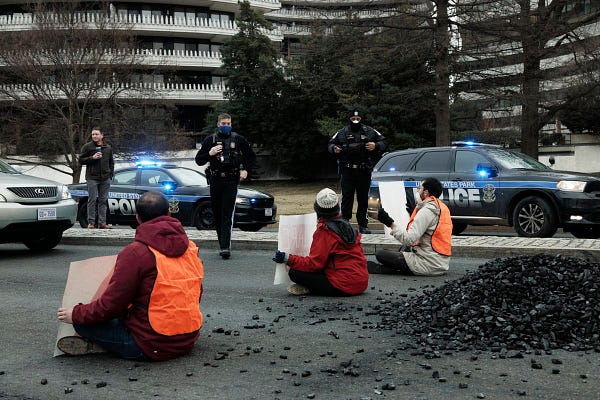PRESENTED BY THE SANDMAN
“It’s now or never, if we want to limit global warming to 1.5C,” IPCC Working Group III co-chair Jim Skea announced today, at the release of the group’s Mitigation of Climate Climate Change report. “Without immediate and deep emissions reductions across all sectors, it will be impossible.”
“Some government and business leaders are saying one thing – but doing another,” UN secretary general António Guterres railed. “Simply put, they are lying. And the results will be catastrophic.”
As Angely Mercado writes, “We haven’t learned our lesson, and we haven’t healed.”
The Biden administration, given this “now or never” ultimatum, is hoping that sorta acting is a valid option.
The White House Office of Management and Budget is now, for the first time, “formally accounting in the Federal Budget for risks of climate change.” Their long-term scenario is that, even if the US keeps its current climate pledges,1 U.S. GDP could be 10 percent below a 1.5°C scenario in 2100 (on the order of $2 trillion a year). Quite frankly, while it’s about time that the White House accountants are admitting climate change exists, even they acknowledge they’re still very far from being realistic about the growing global catastrophe.
The Department of Transportation unveiled stricter fuel economy standards on Friday that . . . keep in place the S.U.V. loophole.
With the Biden administration’s encouragement, U.S. liquefied natural gas exports have risen to a new record.
And on Wednesday, Secretary of Energy Jennifer Granholm will be speaking on climate policy at the fossil-fuel industry front group Center for Climate and Energy Solutions, continuing her steady calendar of praising the good work of carbon polluters to “solve” global warming.
Given the broad failure of the world’s governments to act, more and more citizens are turning to nonviolent civil disobedience, no matter their hope of success. Extinction Rebellion is blocking the Esso West oil facility near Heathrow Airport. “We will continue to block oil facilities until the government agrees to stop all new fossil fuel investments immediately.” XR’s England actions are part of a series of ongoing blockades across the world—including France, Sweden, Canada, Australia, Austria, Germany, Italy, Belgium, Norway, and the United States.
COAL BARON BLOCKADE: This Saturday, April 9th, West Virginia Rising is staging a blockade of the Grant Town coal plant, also known as Sen. Joe Manchin’s (D-W.V.) dirty money machine. All are invited to join in.


The Sierra Club is in the middle of a contentious board of directors election, which will conclude April 27th. The Club has been roiling the past few years during the Age of Trump and COVID with an internal battle over its future. The Club is unique in the U.S. environmental movement in many ways—it is the oldest U.S. environmental organization, founded in 1892 by John Muir; its staff unionized in 1992, unique until recent labor drives; and retains a federated structure with hundreds of volunteer-run chapters.
HuffPost’s Jimmy Tobias has done yeoman’s work to report on the current board battle, despite broad reluctance among participants to participate in interviews. The “Forward Sierra” slate is preferred by the current board of directors and the staff union, who support greater control over the volunteer chapters and their staffing and management procedures. The insurgent “Grassroots Choice” slate includes former Club president Aaron Mair, environmental scientist and cleantech entrepreneur M.K. Dorsey, wildlife biologist Maya Khosla, and New York chapter chair Kate Bartholomew. Mair’s relationship with the board and staff blew up after he objected to an essay by then-executive director Michael Brune strongly implying Muir was a white supremacist. Mair and Dorsey are the only black candidates in the two slates.
Spurred in no small part by the election of Trump and what that means about America, this conflict reflects both the tension between the balance of staff and volunteer leadership in the Club’s organization as well as the inextricable issues of race and culture.
This is Hill Heat, so let’s take a look at the Hill. Congress is cramming in the action before the long Easter break. Among bills under House consideration this week is the SPEED Recovery Act (H.R. 5641), which greatly increases the maximum threshold for rapid FEMA grant approval for small disaster recovery projects from the current $139,800 to $1,000,000.
The marquee hearing is on Wednesday, with Rep. Diane DeGette (D-Colo.) chairing a grilling of six Big Oil CEOs for their war profiteering and windfall profits before her Energy & Commerce subcommittee. I’m gambling that the fossil-funded Republicans will be a little bit nicer to them. Here’s a briefing book on the hearing.
On Tuesday, Senate Commerce chair Maria Cantwell (D-Wash.) is chairing another hearing on gas prices and the petroleum market and Senate Budget chair Bernie Sanders (I-Vt.) is looking at the broader phenomenon of corporate profiteering with witnesses Robert Reich and Groundwork Collaborative’s Lindsay Owens.
Congress is also reviewing Biden’s 2023 budget this week — there are hearings on the proposed budget for the Congressional Budget Office, the Environmental Protection Agency, and the U.S. Army Corps of Engineers and the Bureau of Reclamation, as well as a hearing for tribal representatives and a “Member Day” for representatives to tout environmental projects they want earmarked.
The most interesting hearing, though, may be tomorrow’s hearing on electrifying the Postal Service fleet and why Postmaster Louis DeJoy has failed to do so.
Also: TVA nominees, a year late; the Kigali Amendment, many years late; FEMA priorities; the implementation of the Drinking Water and Wastewater Infrastructure Act; rural renewable energy; the NOAA Chief Scientist Act; wildfire management; the National Transportation Safety Board; international trade and food assistance; Alaska salmon; public transit; energy efficiency; critical minerals (and whether that should include uranium).
And it’s Water Power Week at the Capital Hilton! Featuring Rep. Kim Schrier (D-Wash.), FERC Commissioner Richard Glick, Rep. Ann McLane Kuster (D-N.H.), and more hydro nerds!


The Water Knife is coming: Arizona farmers are getting slammed by water cuts. Sierra snowpack worsens, falls to lowest level in 7 years. Pacific herring are on the verge of collapse. The legacy of redlining is the air we breathe and the soil upon which we build our homes. Green energy is brightening refugee lives in Rwanda.
Bill McKibben gets the last word: “In a world that got off oil the Saudi royal family would be nasty afterthoughts famous mainly for beheading their opponents.”
Climate Action This Week:
Articulation of Indigenous Peoples of Brazil (APIB)
Acampamento terra livre (Free Land Camp)
Thanks for subscribing and spreading the word. DMs are open—@climatebrad





